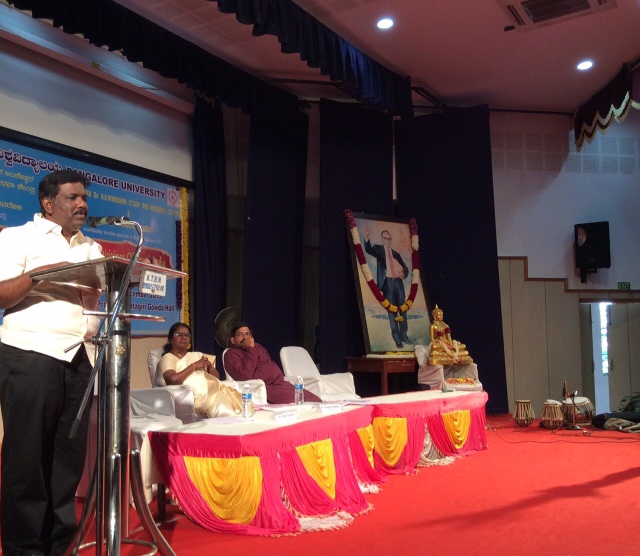பாரம்பரியமாக அர்ச்சகர் நியமனம் செய்யப்படுவதை ஒழித்து கல்வி, பயிற்சி ஆகிய தகுதிகளின் அடிப்படையில் அனைத்து சாதியினரும் அர்ச்சகராக்கப்படவேண்டும் என்ற பரிந்துரையை முதலில் வழங்கியவர் மறைந்த தலித் தலைவர் எல்.இளையபெருமாள் ஆவார். இந்தியாவில் மணடல் கமிஷன் நியமிக்கப்படுவதற்கு முன்னர் மத்திய அரசால் உருவாக்கப்பட்ட கமிஷன் எல்.இளையபெருமாள் தலைமையிலான ஒரு நபர் கமிஷன். committee on untouchability, Economic and Educational Development of the Scheduled Castes என ஆங்கிலத்தில் அழைக்கப்பட்ட அந்தக் குழு பொதுவாக ’இளையபெருமாள் கமிட்டி’ என்றே அழைக்கப்படுகிறது. அந்தக் குழுவின் சார்பில் அவர் இந்தியாவெங்கும் சுற்றுப்பயணம் செய்து தாழ்த்தப்பட்ட பழங்குடி மக்களின் சமூக கல்வி பொருளாதார மேம்பாட்டுக்கான ஆலோசனைகளை 1969 ஆம் ஆண்டு மத்திய அரசிடம் அறிக்கையாக சமர்ப்பித்தார்.
இளையபெருமாள் கமிட்டியின் அறிக்கையை மத்தியிலிருந்த காங்கிரஸ் அரசு செயல்படுத்தவில்லை என்றபோதிலும் அப்போது தமிழ்நாட்டில் இருந்த திமுக அரசு அந்த அறிக்கையில் சுட்டிக்காட்டப்பட்ட அர்ச்சகர் நியமனம் குறித்த பரிந்துரையின் முக்கியத்துவத்தைக் கருத்தில்கொண்டு தமிழ்நாடு இந்து சமய அறநிலைய சட்டத்துக்கு திருத்த சட்டம் ஒன்ற 1970 ஆம் ஆண்டு கொண்டுவந்தது. அதை எதிர்த்து அர்ச்சகர்கள்,மடாதிபதிகள் சார்பில் 12 வழக்குகள் தொடுக்கப்பட்டன. பராசரன், பல்கிவாலா என மூத்த வழக்கறிஞர்களை நியமித்து அந்த திருத்த சட்டத்துக்குத் தடைபோட முயன்றார்கள். நீதித்துறை வரலாற்றில் ’சேஷம்மாள் மற்றும் இதரர் எதிர் தமிழக அரசு’ என அந்த வழக்கு அறியப்படுகிறது.
சேஷம்மாள் வழக்கில் தமிழக அரசு தாக்கல் செய்த பதில் மனுவில் இளையபெருமாள் கமிட்டியின் பரிந்துரையின் அடிப்படையில் சமூக சீர்திருத்தத்தை மேற்கொள்ளவேண்டும் என்ற நோக்கில்தான் இந்தத் திருத்தச் சட்டம் கொண்டுவரப்பட்டது எனத் தெளிவாகக் குறிப்பிடப்பட்டுள்ளது (அதை கீழே தந்திருக்கிறேன்)
அர்ச்சகர் நியமனம் குறித்த வழக்கில் உச்சநீதிமன்றம் இப்போது தீர்ப்பளித்திருக்கும் நிலையில் தலைவர் எல்.இளையபெருமாள் அவர்களை நன்றியோடு நினைவுகூர்வோம்.
சேஷம்மாள் வழக்கில் உச்சநீதிமன்றம் அளித்த தீர்ப்பின் பக்கம் 6 ல் இருக்கும் பகுதி இது:
The Principal Act of 1959 was amended in certain respects by the Amendment Act of 1970 which came into, force on January 8, 1971. Amendments were made to sections 55, 56 and 116 of the Principal Act and some consequential provisions were made in view of those amendments. The
Amendment Act was enacted as a step towards social reform on the recommendation of the
Committee on Untouchability, Economic and Educational Development of the Scheduled Castes.
The Statement of Objects and Reasons which are reiterated in the counter-affidavit filed on behalf of
the State of Tamil Nadu is as follows :
"In the year 1969 the committee on untouchability, Economic and Educational Development of the Scheduled Castes has suggested in its report that the hereditary
priesthood in the Hindu Society should be abolished, that the system can be replaced by an ecclesiastical Organisation of men possessing the requisite educational qualifications who may be trained in recognised institutions in priesthood and that the line should be open to all candidates irrespective of caste, creed or race. In Tamil Nadu Archakas, Gurukkals and Poojaries are all Ulthurai servants in Hindu temples. The duties of Ulthurai servants relate mainly to the performance of poojas, rituals and other services to the deity, the recitation of mantras, vedas, prabandas, the varams and similar invocations and the performance of duties connected with such performance and recitations. Sections 55 and 56 of the Tamil Nadu Hindu Religious and Charitable, Endowments Act, 1959 (Tamil Nadu Act 22 of 1959) provide for
appointment of office holders and servants in the religious institutions by the trustees by applying the rule of hereditary succession also. As a step towards social reform Hindu temples have already been thrown open to all Hindus irrespective of caste........
In the light of the recommendations of the Committee and in view of the decision of this Court in
Gazula Dasaratha Rama Rao v. State of Andhra Pradesh & Ors.(1) and also as a further step towards social reform the Government considered that the here- ditary principle of appointment of all office holders in the Hindu temples should be abolished and accordingly it proposed to amend sections 55, 56 and 116 of the Tamil Nadu Hindu Religious and Charitable Endowments Act, 1959 (Tamil Nadu Act XXII of 1959).












